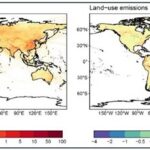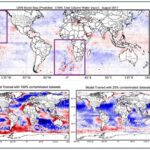Publication – Environmental News Network
Date: July 16, 2012
“Bill Clinton on Managing Scarce Resources“
Former US President Bill Clinton addressed a group at the Oxford University ReSource forum recently on the subject of scarce resources and how to manage their development and use in a way that is fair and equitable.
The most important decision of the 21st century is whether the human race can learn to share its scarce natural resources for the common good, President Bill Clinton told delegates at the two-day gathering of 250 leaders from business, finance, policy and government.
“The only strategy that makes sense is the one that says we are going to share the world with other human beings and we will share its natural resources.’ This, he said, ‘is the fundamental decision of the 21st century,” Clinton said.
Clinton’s address reflected a key theme from the conference about the need for greater cooperation between governments, businesses and other organisations to successfully meet the resource challenges the world, according to the article. In particular, he noted, the private sector has the commercial leverage and influence to drive significant changes — and can create new models in finance to support these changes.
Publication – Science Daily
Date: July 18, 2012
“Society’s Response to Climate Change Is Critical“
Lancaster University (UK) scientists have proposed a new way of considering society’s reactions to global warming by linking societal actions to temperature change.
Using this framework to analyze climate change, they suggest that society will have to become fifty times more responsive to global temperature change than it has been since 1990, according to Science Daily
The researchers, Dr Andy Jarvis, Dr David Leedal and Professor Nick Hewitt from the Lancaster Environment Centre, also propose that if global energy use continues to grow as it has done historically, society would have to up its decarbonization efforts from its historic (160 year) value of 0.6% per year to 13% per year.
“In order to avoid dangerous climate change, society will have to become much more responsive to the risks and damages that growth in global greenhouse gas emissions impose,” Dr. Andy Jarvis told Science Daily.
Publication – NewsWise
Date: July 19, 2012
“First Half of 2012 Dry and Drought Conditions to Persist in Parts of the Northeast“
The first half of 2012 was dry for most of the Northeast.
New York, Massachusetts, Pennsylvania, New Jersey, and West Virginia were below normal, according to NewsWise. Maryland and Connecticut were much below normal, and Delaware had its driest on record.
The Northeast as a whole had 89 percent of its normal precipitation for the six-month period. The lack of rain has continued into July, causing abnormally dry and moderate drought conditions across the Northeast.
Year-to-date precipitation, through July 18, is below normal at all of the First Order stations, and thirteen of the 35 stations have had less than 80 percent of normal precipitation – the driest areas being Wilmington DE, Baltimore MD, and Philadelphia PA.
According to the article, “In the Northeast, dry conditions are expected to persist in a band stretching from Lake Erie east through Albany as well as western Pennsylvania. The same holds for Maryland, Delaware, western Massachusetts and parts of Virginia, although conditions in those areas are expected to slightly improve.”
Publication – Environmental News Network
Date: July 20, 2012
“Uninformed Generation X are unconcerned about climate change“
With the United States suffering a summer of record-shattering heat and the UK experiencing record summer rainfall, a University of Michigan report finds that Generation X is uninformed about the causes and unconcerned about the potential dangers.
“Most Generation Xers are surprisingly disengaged, dismissive or doubtful about whether global climate change is happening and they don’t spend much time worrying about it,” Jon D. Miller, author of “The Generation X Report” told Environmental News Network.
The new report, the fourth in a continuing series, compares Gen X attitudes about climate change in 2009 and 2011, and describes the levels of concern Gen Xers have about different aspects of climate change, as well as their sources of information on the subject, according to the article.
“We found a small but statistically significant decline between 2009 and 2011 in the level of attention and concern Generation X adults expressed about climate change,” Miller said. “In 2009, about 22 percent said they followed the issue of climate change very or moderately closely. In 2011, only 16 percent said they did so.”
Publication – Science Daily
Date: July 20, 2012
“U.S. Experiences Warm and Dry June; Drought Expands to 56% of Lower 48“
The average temperature for the contiguous U.S. during June was 71.2°F, 2.0°F above the 20th century average, ranking as the 14th warmest June on record, according to Science Daily.
Scorching temperatures during the second half of June broke or tied over 170 all-time temperature records in cities across America, Science Daily reported. June temperatures also contributed to a record-warm first half of the year and the warmest 12-month period the nation has experienced since recordkeeping began in 1895.
Warmer-than-average temperatures anchored across the Intermountain West and much of the Great Plains during June. Colorado had its warmest June on record, with a statewide temperature 6.4°F above average. Seven additional states in the region had a top ten warm June. However, cooler-than-average temperatures were present for the Pacific Northwest, where Washington had its seventh coolest June on record. Cool conditions were also present for the Southeast, despite record warm temperatures towards the end of the month.
According to the article, “Precipitation totals across the country were mixed during June. The Lower 48 experienced their tenth driest June on record, with a nationally averaged precipitation total of 2.27 inches, 0.62 inch below average. Record and near-record dry conditions were present across the Intermountain West, while Tropical Storm Debby dropped record precipitation across Florida. Drier-than-average conditions were present from the West, through the Plains, into the Ohio Valley and Mid-Atlantic. Wyoming had its driest June on record, with a precipitation total 1.27 inches below average. Eleven additional states from Nevada to Kentucky had June precipitation totals ranking among their ten driest.”
Have you seen breaking climate change news or discussion that should be included in our next “Roundup?” Let us know!





